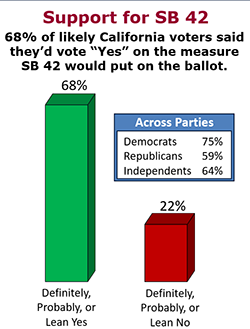 Yes on Prop. 15
PROPOSITION 15, the initiative on the June ballot to publicly finance the 2014 and 2018 campaigns for secretary of state, won't eliminate the influence of money in politics. What it will do is take a small step in the right direction. And if it's successful, it could lead to much-needed broader campaign finance reform. The problems with the existing system are well-chronicled. Candidates spend so much time fundraising that they don't have time to talk to voters. Politicians become so beholden to contributors that they can't - or won't - do what's right for constituents. Proposition 15 is a pilot project that attempts to remove the corrupting influence of money in one race. Given that the secretary of state oversees elections, it's a good place to start. Democratic and Republican candidates would have to show broad support by collecting 7,500 $5 contributions. In return, they'd get at least $1 million for the primary and $1.3 million for the general election. And they could receive up to $4 million for the primary and $5.2 million for the general to match a candidate who declines public financing and its limits - think Meg Whitman - or for counterattacks against independent groups. The money to do this would come from a $350 annual fee on lobbyists, who are regulated by the secretary of state. The plan includes provisions to accommodate minor-party candidates as well as tight restrictions on candidates who accept funds. Good-government groups like Common Cause and the League of Women Voters are behind the proposition. They hope the method of financing is so successful that it's expanded to include other offices, further reducing special-interest power. In other states with public financing, voters and politicians strongly support it. Opponents of the initiative, primarily lobbyists who would lose business if it becomes law, admit campaign finance reform is needed, just not this way. But they have no ideas of their own, and some of their arguments against Proposition 15 are misleading. They suggest that public financing could attract fringe candidates. But that hasn't happened in other states. They say the fact that candidates could raise some private money if there were a shortfall in state funding negates the effect of the reform. That's silly. The potential for corruption would still be reduced. And - exploiting a hot-button issue - they keep repeating that it "raises taxes." Not true. The $350 fee affects only registered lobbyists; no one else pays a dime. The Legislature would need to find another source of revenue to expand this to other races. But it can't impose a new tax or approve a budget without a two-thirds vote. Even then, taxpayers would not end up paying more: Publicly financed campaigns in other states have saved taxpayers millions by limiting special-interest influence. In Connecticut, for example, lawmakers last year reformed the state's bottle recycling program, requiring recyclers to return millions in unclaimed deposits to the state, rather than keeping it for themselves. The changes had been proposed for years, but they were approved only after public financing was introduced. Proposition 15 authors spent years studying how the strengths and flaws of other states' systems would relate to a big state like California. What they've proposed will make government more accountable to people, not special interests. There's no doubt that this is worth trying. Vote yes on Proposition 15. See the article on Los Angeles Daily News website (In accordance with Title 17 U.S.C. Section 107, this material is distributed without profit to those who have expressed a prior interest in receiving the included information for research and educational purposes.) |



